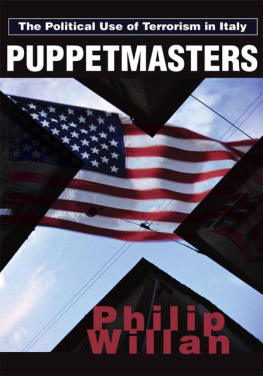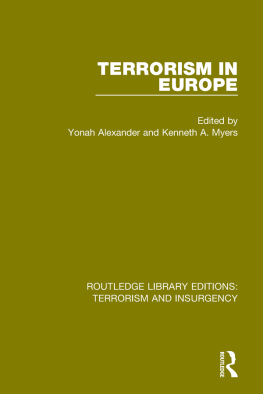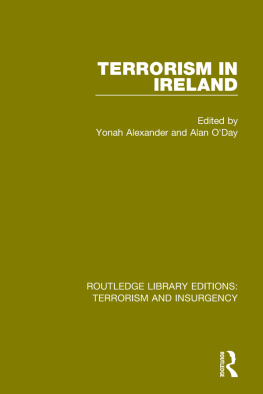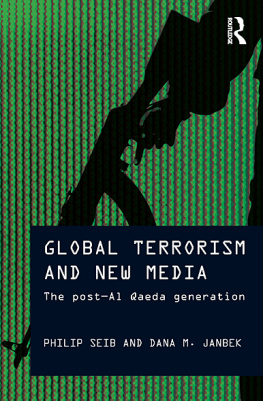Philip Willan - Puppetmasters: The Political Use of Terrorism in Italy
Here you can read online Philip Willan - Puppetmasters: The Political Use of Terrorism in Italy full text of the book (entire story) in english for free. Download pdf and epub, get meaning, cover and reviews about this ebook. year: 2002, publisher: iUniverse, genre: Politics. Description of the work, (preface) as well as reviews are available. Best literature library LitArk.com created for fans of good reading and offers a wide selection of genres:
Romance novel
Science fiction
Adventure
Detective
Science
History
Home and family
Prose
Art
Politics
Computer
Non-fiction
Religion
Business
Children
Humor
Choose a favorite category and find really read worthwhile books. Enjoy immersion in the world of imagination, feel the emotions of the characters or learn something new for yourself, make an fascinating discovery.
- Book:Puppetmasters: The Political Use of Terrorism in Italy
- Author:
- Publisher:iUniverse
- Genre:
- Year:2002
- Rating:4 / 5
- Favourites:Add to favourites
- Your mark:
- 80
- 1
- 2
- 3
- 4
- 5
Puppetmasters: The Political Use of Terrorism in Italy: summary, description and annotation
We offer to read an annotation, description, summary or preface (depends on what the author of the book "Puppetmasters: The Political Use of Terrorism in Italy" wrote himself). If you haven't found the necessary information about the book — write in the comments, we will try to find it.
Puppetmasters: The Political Use of Terrorism in Italy — read online for free the complete book (whole text) full work
Below is the text of the book, divided by pages. System saving the place of the last page read, allows you to conveniently read the book "Puppetmasters: The Political Use of Terrorism in Italy" online for free, without having to search again every time where you left off. Put a bookmark, and you can go to the page where you finished reading at any time.
Font size:
Interval:
Bookmark:
PUPPETMASTERS
The political use of
terrorism in Italy
PHILIP WILLAN
Authors Choice Press
San Jose New York Lincoln Shanghai
Puppetmasters
The Political Use of Terrorism in Italy
All Rights Reserved 1991, 2002 by Phillip Willan
No part of this book may be reproduced or transmitted in
any form or by any means, graphic, electronic, or mechanical,
including photocopying, recording, taping, or by any
information storage or retrieval system, without the
permission in writing from the publisher.
Authors Choice Press
an imprint of iUniverse, Inc.
For information address:
iUniverse, Inc.
5220 S. 16 th St., Suite 200
Lincoln, NE 68512
www.iuniverse.com
Originally published by Constable and Company Ltd
A CIP catalogue record for this book
is available from the British Library
ISBN: 0-595-24697-4
ISBN: 978-1-4697-1084-6 (ebook)
Contents
[1]
IN DEFENCE OF DEMOCRACY
[2]
THE ORIGINS OF TERROR
[3]
THE MASONIC CONSPIRACY
[4]
GELLI AND AMERICA
[5]
MINO PECORELLI
[6]
THE COUP SEASON
[7]
COVERING UP FOR THE BOMBERS
[8]
OPERATION GLADIO
[9]
STILL COVERING UP
[10]
MANIPULATING THE LEFT
[11]
THE MORO KIDNAP
[12]
THE PECORELLI VERSION
[13]
THE MAGLIANA MESSAGES
[14]
THE MORO DOCUMENTS
[15]
MR BROWNS STORY
[16]
MORE VALUED THAN MORO?
[17]
TIME FOR GLASNOST IN THE WEST
Treason doth never prosper: whats the reason?
For if it prosper, none dare call it treason.
Sir John Harington, 1561-1612
The manipulation of Italian terrorism is a complex and highly controversial subject. Many of the most interesting insights come from highly suspect sources: terrorists, common criminals and members of the secret services, who, if they are not licensed to kill, are certainly expected to lie in the interests of the state. Nobodys word, therefore, should be taken on trust. Wherever possible, I have identified the sources of my information and I believe that the many fragments go to make up a plausible overall pattern.
Italian magistrates constitute one of the most reliable sources. Many of them are highly intelligent, courageous and independent-minded people, who have generated hundreds of thousands of pages of written reports to describe crimes of politically motivated violence in their country. Much of what is known about Italian terrorism today is the result of their skill in threading a path through the innumerable traps and obstacles that have been laid in their way. Until 1989, a judicial investigation had to be initiated by a public prosecutor. He would then work in tandem with an examining magistrate. At the end of the investigation, the prosecutor submitted his written recommendations to the examining magistrate, who responded with a written report of his own, and the prosecutor then took the case forward to the actual trial. The result of this somewhat laborious process is a vast fund of documentary evidence about Italian crime. Following a judicial reform introduced in October 1989, the role of the examining magistrate has been greatly reduced and the length of the pre-trial investigation has also been curtailed.
Paradoxically, while some practitioners of Anglo-Saxon law have been impressed by Italys success in defeating terrorism and have been advocating a move towards the Italian legal system, the Italians have decided to change theirs to something closer to the British or American model. As we shall see, the efficacy of the Italian judicial system was by no means the only reason for the countrys ultimate success in eradicating domestic terrorism.
The Italian secret service played a crucial role in both the rise and the fall of Italian terrorism. The military intelligence service has been through a bewildering series of name changes as a result of the political scandals and conspiracies in which it has been involved, each new name supposedly indicating that the service has been changed and reformed. The Servizio Informazioni Militari (Military Information Service) or SIM was established in 1925 and disbanded in 1945 at the end of the Second World War. Only in 1949 did the Allies allow the service to be re-established as SIFAR (Servizio Informazioni Forze Armate-Armed Forces Information Service). SIFAR was succeeded, from 1965 to 1977, by SID (Servizio Informazioni Difesa-Defence Information Service). In 1977 the current system was established, with SISMI (Servizio per le Informazioni e la Sicurezza Militare-Military Information and Security Service) taking over from SID and a new domestic intelligence service, SISDE (Servizio per le Informazioni e la Sicurezza Democratica-Democratic Information and Security Service), being created. The two services report to the Defence Minister and the Interior Minister respectively, as well as to a coordinating committee presided over by the Prime Minister. Despite these many reincarnations, the creature does not seem to have changed its spots and has frequently been accused of collusion with terrorism.
Another useful source of information comes from the obscure hints and blackmailing messages uttered by some of the protagonists in the story. These do not necessarily provide reliable guidance but they can cast an interesting light on events in the absence of more concrete evidence, and they are an established feature of Italian political life.
For the purposes of this book I have accepted the conclusions of the Parliamentary P2 Commission that the lodge membership lists found in the possession of Licio Gelli are an accurate guide to the lodges adherents. Many of the people named in the lists disagree.
This book is dedicated to those who helped and to those who wouldnt, whatever their reasons.
[1]
IN DEFENCE OF DEMOCRACY
AT 10.25 a.m. on 2 August 1980, a powerful bomb exploded in the second-class waiting room at Bologna railway station. It was the height of the summer holiday season and the station was crowded with tourists and Italians heading for their holidays by the sea. Eighty-five people were killed and 200 injured in one of the worst terrorist atrocities seen in Europe since the war. Seven of the victims were children under the age of fifteen, one of them a girl of three. Ten foreigners were killed in the blast, including a young English couple and a twenty-year-old student from Japan, the victims of a conflict they can have known nothing about. More than a decade later very little is known for certain about the bombing. What is clear, however, is that the Italian secret services worked hard to prevent judicial investigators from uncovering the truth. Partly for this reason, the process of justice has followed a pattern set in previous terrorist bombings, with initial convictions being overturned on appeal and mystery ultimately shrouding the identity of the bombers.
If the genesis of the Bologna bombing remains obscure, the political background to the earlier bombings has become increasingly plain. Eight indiscriminate bomb attacks on the Italian public, from the bombing of a bank in Milan on 12 December 1969 to the blowing up of a train near Florence on 23 December 1984, cost 150 lives and injured 818 people over a fifteen-year period. Magistrates now attribute much of that violence to a strategy of terrorism fostered by Italian and foreign secret services and designed to prevent the Communist Party from achieving power. The Bologna station bombing has also been attributed to that strategy, following a seven-year judicial investigation. On 11 July 1988, after a trial lasting more than a year, a Bologna assize court convicted four right-wing extremists of planting the bomb and sentenced them to life imprisonment. But two years later, on 18 July 1990, an appeal court in the same city overturned that verdict. There was widespread consternation as yet another terrorist outrage went unpunished. Amid all the uncertainty, alarming new hypotheses have begun to emerge as to the motivation of the Bologna bombing.
Next pageFont size:
Interval:
Bookmark:
Similar books «Puppetmasters: The Political Use of Terrorism in Italy»
Look at similar books to Puppetmasters: The Political Use of Terrorism in Italy. We have selected literature similar in name and meaning in the hope of providing readers with more options to find new, interesting, not yet read works.
Discussion, reviews of the book Puppetmasters: The Political Use of Terrorism in Italy and just readers' own opinions. Leave your comments, write what you think about the work, its meaning or the main characters. Specify what exactly you liked and what you didn't like, and why you think so.













